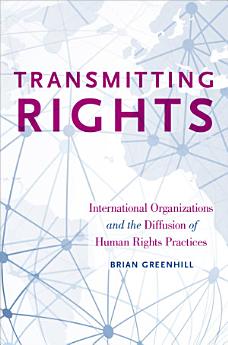Transmitting Rights: International Organizations and the Diffusion of Human Rights Practices
Brian Greenhill
नव॰ 2015 · Oxford University Press
4.3star
3 समीक्षाएंreport
ई-बुक
240
पेज
family_home
योग्य
info
reportरेटिंग और समीक्षाओं की पुष्टि नहीं हुई है ज़्यादा जानें
shoppingmodeइस किताब पर, 29 जुल॰ से 32% की छूट चल रही है
इस ई-बुक के बारे में जानकारी
When considering the structures that drive the global diffusion of human rights norms, Brian Greenhill argues that we need to look beyond institutions that are explicitly committed to human rights and instead focus on the dense web of international government organizations (IGOs)-some big, some small; some focused on human rights; some not-that has arisen in the last two generations. While most of these organizations have no direct connection to human rights issues, their participation in broader IGO networks has important implications for the human rights practices of their member states. Featuring a rigorous empirical analysis, Transmitting Rights shows that countries tend to adopt similar human rights practices to those of their IGO partners, whether for better or worse. Greenhill argues that IGOs constitute a tightly-woven fabric of ties between states and that this network provides an important channel through which states can influence the behavior of others. Indeed, his analysis suggests that a policy of isolating "rogue" states is probably self-defeating given that this will reduce their exposure to some of the more positive IGO-based influences on their human rights. Greenhill's analysis of the role of IGOs in rights diffusion will not only increase our understanding of the international politics of human rights; it will also reshape how we think about the role of international institutions in world politics.
रेटिंग और समीक्षाएं
4.3
3 समीक्षाएं
लेखक के बारे में
Brian Greenhill is an Assistant Professor in the Department of Government at Dartmouth College. His primary research interest is in the effects that economic globalization and the continuing development of international institutions have on the development of human rights practices. At Dartmouth he teaches courses on human rights, globalization, international institutions and quantitative methods.
इस ई-बुक को रेटिंग दें
हमें अपनी राय बताएं.
पठन जानकारी
स्मार्टफ़ोन और टैबलेट
Android और iPad/iPhone के लिए Google Play किताबें ऐप्लिकेशन इंस्टॉल करें. यह आपके खाते के साथ अपने आप सिंक हो जाता है और आपको कहीं भी ऑनलाइन या ऑफ़लाइन पढ़ने की सुविधा देता है.
लैपटॉप और कंप्यूटर
आप अपने कंप्यूटर के वेब ब्राउज़र का उपयोग करके Google Play पर खरीदी गई ऑडियो किताबें सुन सकते हैं.
eReaders और अन्य डिवाइस
Kobo ई-रीडर जैसी ई-इंक डिवाइसों पर कुछ पढ़ने के लिए, आपको फ़ाइल डाउनलोड करके उसे अपने डिवाइस पर ट्रांसफ़र करना होगा. ई-रीडर पर काम करने वाली फ़ाइलों को ई-रीडर पर ट्रांसफ़र करने के लिए, सहायता केंद्र के निर्देशों का पालन करें.





